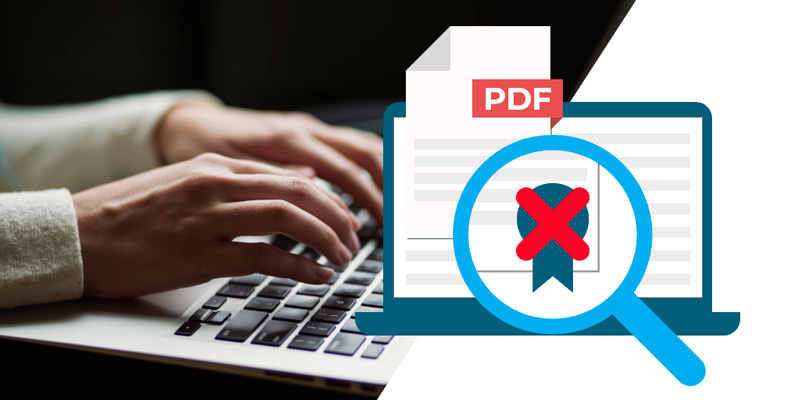Massively used in a wide variety of contexts, the PDF format is extremely popular. Its ease of use and almost universal use make it a natural choice for sending and sharing documents, whatever their nature. Important documents, diplomas, bank account details and certificates of all kinds are commonly digitalized in this extremely practical format, and sometimes protected by a password.
Is this digitalization of documents and certificates enough to allow PDFs to be considered digital credentials? Let BCdiploma explain some important differences between PDF files and digital credentials.
What is a digital diploma?
What exactly is a PDF file?
The PDF (Portable Document Format) was created in 1993 by Adobe Systems, and allows the layout of a document to be preserved, regardless of the software used to open it. Thus formatting, fonts and also tables, margins and images are preserved, regardless of the software or operating system on which the document is opened. Such characteristics have made the PDF one of the most commonly used formats, especially for the sharing of important documents.
For example, in order to prove one’s identity or possession of a diploma or certificate, it is a piece of cake to send the entity making the request a scanned copy of the relevant document in the PDF format.
The definition of a digital credential
Digital credentials are digital certificates issued by an authorized institution. There are many documents that can claim the status of a digital credential, including digital diplomas and certificates, Open Badges, Skills Blocks, and so on. The digital credential in each case is a digital version of a physical document. However, the similarity between a digital credential and a PDF ends there. In no way can a digital credential be compared to a digitized version of a document that has been merely scanned. Indeed, a digital credential is designed ad hoc for digital use, and can only be issued by an entity that has the necessary authority to do so, unlike a PDF which can be created and, if not sufficiently protected, modified by anyone.

What are the limitations of PDFs?
Once a PDF document has been sent, it is out of your control
The PDF format is extremely convenient, but when it comes to the security of certain documents, such as an identity card or a driving license, this solution is extremely unsatisfactory. Indeed, once a PDF document is sent, the recipient has full control over that copy of the document, and can use it for any valid or fraudulent purpose, for example, modifying it and using under false pretenses. It is extremely easy to modify a PDF, with simple tools such as Microsoft Paint or Photoshop, and therefore to create a counterfeit document, despite any protective measures that can be applied to the PDF.
Furthermore, in the case of an institution wishing to revoke the certification granted to an individual, it is impossible to signal that the document presented by such an individual is no longer valid or compliant.
PDFs have size and format limitations
While a PDF can contain a large number of pages of text and images, its size can be problematic when sending it by email. What’s more, the format of a PDF makes it inconvenient to share on social media platforms, such as Facebook or LinkedIn.
The advantages of digital credentials
Digital credentials are far more suitable than simple PDF files, first of all, in terms of security and document control. Indeed, a digital credential:
- Is unalterable: it cannot be modified because it is encrypted on a blockchain;
- Contains cryptographic proof that it was issued by an entity authorized to do so;
- Can be easily verified by any person or organization to which it is presented;
- Is always accessible;
- Remains under the control of its holder, even after it has been shared.

Issue your digital credentials with BCdiploma
BCdiploma supports organizations wishing to modernize their certification systems and issue blockchain certified digital credentials. To issue tamper-proof, always accessible and easily verifiable digital certifications, contact us and equip your organization with a tool that is as simple as it is modern!
[title[Why are PDFs not considered digital credentials?]] [description[Is it appropriate to regard PDFs as digital credentials? BCdiploma clarifies the significant distinctions between PDF documents and genuine digital credentials.]]